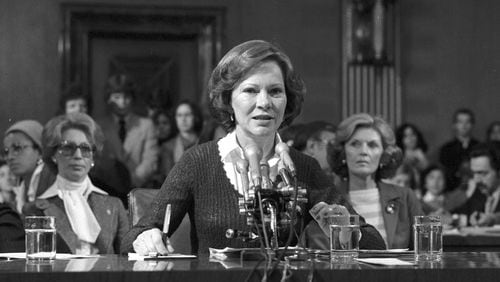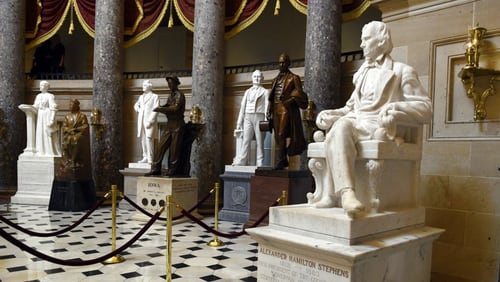It was 1975, and future first lady Rosalynn Carter had just returned to Plains from the campaign trail to find her mother at home crying.
Allethea Smith — who had to sell the family farm and raise her four children alone after her husband died of leukemia in 1940, when Rosalynn was only 13 — was upset because she had been forced to retire from her job at the post office. The reason? She had turned 70 years old.
“Nobody thinks I can do good work anymore,” Carter’s mother said.
Rosalynn Carter drew on that moment, and how it made her mother feel, when she helped end mandatory retirement provisions in the federal code.
As a compassionate woman who was no stranger to hardship, Carter would use her influence and collaboration skills to improve mental health care in the country; secure vaccination requirements for school-age children and champion caregivers throughout her life. She traveled the world with her husband, Jimmy, building houses for poor people and working to eradicate disease. The list of accomplishments for the former first lady, who died Nov. 19 at the age of 96, goes on and on, and continued long after the Carters left the White House.
But what most resonates with me about Rosalynn Carter was a failed undertaking that she considered one of her greatest disappointments: the languishing Equal Rights Amendment.
In January 1977, when the Carters moved into the White House, I was 6 years old. They were the first “first family” that I remember, and something about them felt familiar — maybe because they, like my parents, had migrated from the South, at least temporarily.
I attended a laboratory school, which served as a testing ground for new educational models and ideas. The moments I cherished most were when our music teacher would use our class time to play “Free to Be You and Me.” The 1972 album, by Marlo Thomas and Friends, instilled lessons of tolerance into generations of kids and attempted to free us from gendered social conventions.
We would race full speed around the room to the opening notes of banjo strumming before dropping breathless to the floor and lying on our backs with our eyes closed as we listened to the album and celebrated a world where girls were free to be scientists and boys weren’t afraid to cry.
Unbeknownst to me, Rosalynn Carter was hard at work trying to create the kind of world that I was being raised to believe already existed.
Each month, she held White House meetings with advocates and activists who supported the ERA, which was first introduced in 1923 to remove legal distinctions between men and women in matters such as property, employment and divorce. Opponents, led by conservative attorney Phyllis Schlafly, believed that women were already protected under the Constitution and that the ERA would undermine families.
Carter appeared with Betty Friedan, Betty Ford, Bella Abzug and others in 1977 at the National Women’s Conference in Houston. The women stood shoulder to shoulder, hands clasped and arms raised above their heads, in a show of solidarity captured in a photo.
I imagine at that moment, Carter, a Southern Baptist, was summoning her growing political skills to embrace this movement that had been disparaged and radicalized by many Americans.
She “wanted to present the ERA in a way that would appeal to mothers, housewives and Southerners,” Baylor University religion professor Elizabeth Flowers said in a 2016 interview with Texas Christian University Magazine. “She felt like, if they could win over this segment, then the ERA had a chance of passing.”
Yet, all these years later, we’re still waiting for those protections for women’s rights to be added to the Constitution.
The disappointment of ERA supporters’ failure to secure a constitutional amendment stayed with Carter. “Although there has been progress,” she explained seven years ago, “women still struggle to take their full, rightful places in politics, the media, business and athletics.”
Carter was born during a time and in a place where many women didn’t assert themselves in public life.
She pushed her own limits, and faced criticism, while managing to stay secure in herself, a lesson that remains relevant today.
She never seemed overly concerned about whether she or other women stayed “in their place.”
As first lady, Carter was the first to hire a chief-of-staff and made sure the job held a rank and salary on par with other White House staff. She encouraged women to work outside of the home and lobbied the Pentagon to hire more women as White House honor guards. And, as president, her husband appointed more women to public offices than all previous presidents combined.
She used to tell this story. One afternoon about a year into Jimmy Carter’s presidency, she met her husband at the White House elevator.
She began to pepper him with her usual questions about what progress had been made on particular issues. She wanted to know so she could share an informed perspective when she talked to American voters around the country. She didn’t want to rely on getting her information from the newspapers or television. She wanted to hear it directly from the source.
“Why don’t you come to cabinet meetings and then you will know why we do things,” the president said.
This is how she became a regular attendee at cabinet meetings, she said in a 2013 interview for “First Ladies: Influence and Image,” filmed at the Carter Center.
“I could have stayed at the White House, poured tea, had receptions, and I would have been criticized as much as I was criticized outside for what I did,” she said.
But Carter believed deeply in her ability to make a difference in the world, and she gave it her all.
Even in the moments when she couldn’t effect change, she had no regrets.
Read more on the Real Life blog (www.ajc.com/opinion/real-life-blog/) and find Nedra on Facebook (www.facebook.com/AJCRealLifeColumn) and Twitter (@nrhoneajc) or email her at nedra.rhone@ajc.com.







